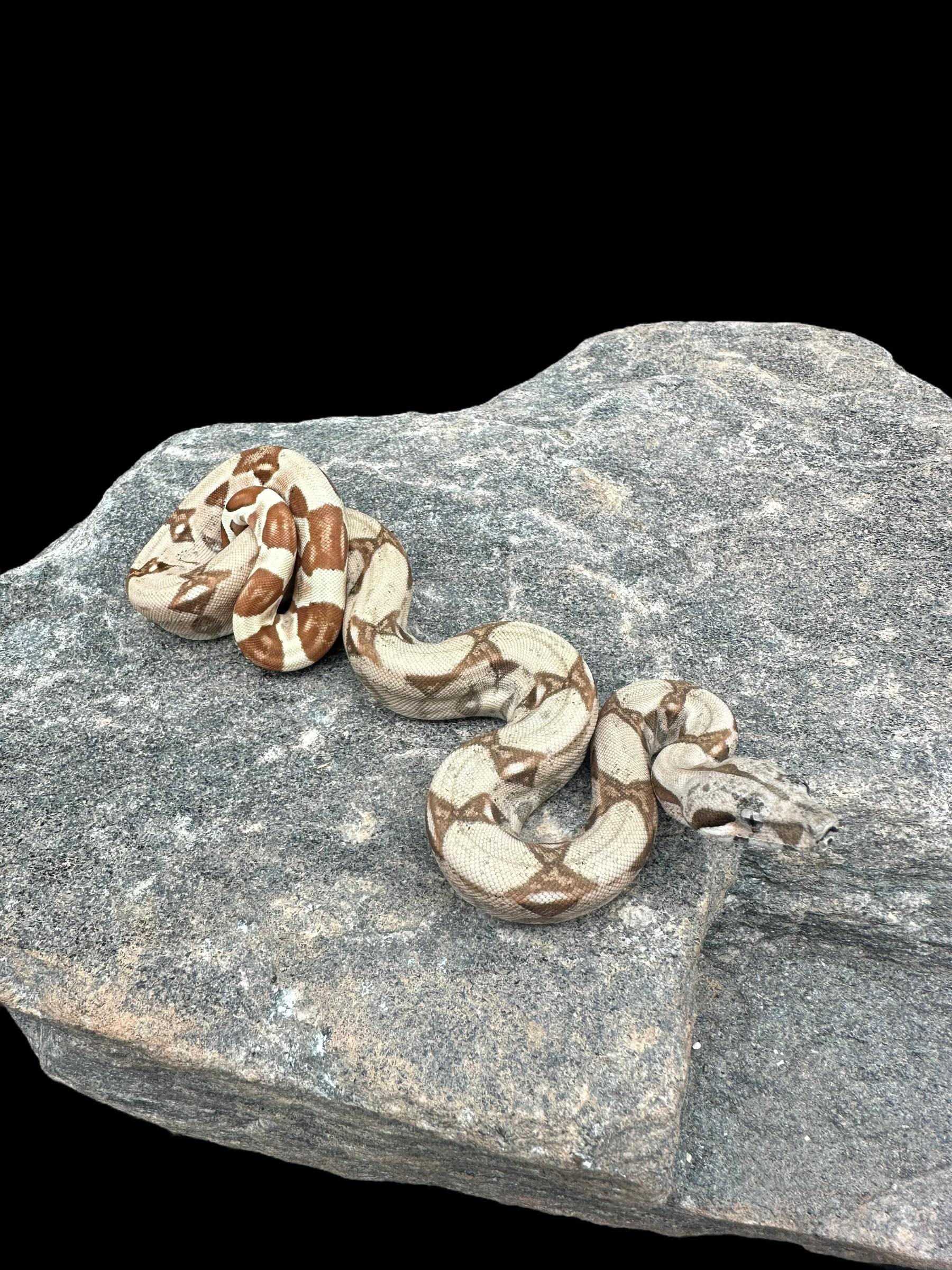Photo Disclaimer
Description
B.C.I (Hypo Het Snow)
Scientific Name: Boa constrictor imperator
Common Name: B.C.I, Hypo Het Snow
Species Overview
Size: Adults typically reach 6–8 feet (1.8–2.4 m) in length, with females generally larger and heavier-bodied than males. Adult weight commonly ranges from 15–30 pounds, depending on sex, genetics, and overall husbandry.
Appearance: Hypomelanistic Boa constrictors exhibit reduced dark pigmentation, resulting in brighter overall colouration, enhanced contrast, and cleaner, more defined patterning. This individual carries additional recessive genetics associated with Snow-type combinations, though these traits are not visually expressed.
Distribution: Naturally distributed throughout Central America and into northern regions of South America.
Habitat: Occupies a broad range of environments including tropical forests, scrublands, agricultural margins, and riparian zones.
Behaviour: A nocturnal ambush predator that relies on camouflage and patience. Juveniles are more arboreal, while adults become predominantly terrestrial, spending daylight hours concealed.
Captive Care
Enclosure: A spacious, naturalistic enclosure is strongly recommended. Adults should be provided with a minimum enclosure size of 6′ × 2′ × 2′ (183 × 61 × 61 cm). Include multiple hides, sturdy branches, cork bark, and visual barriers. Soil-based or mulch substrates help maintain humidity and support natural behaviours.
Temperature and Humidity: Maintain an ambient temperature gradient of 80–85°F (27–29°C), with a basking area of 88–92°F (31–33°C). Nighttime temperatures may drop to 75–78°F (24–26°C). Humidity should remain between 55–70%, supported by a large water bowl and occasional misting.
Lighting: Standard ambient lighting on a day–night cycle is sufficient. Low-level UVB is optional and may be beneficial in planted or bioactive enclosures.
Diet: Juveniles should be fed appropriately sized rodents every 7–10 days. Adults typically feed every 14–21 days, adjusted based on body condition and prey size.
Behaviour in Captivity: Generally hardy and tolerant of handling when consistently maintained. Feeding responses can be strong, so clear routines and confident handling are important.
Special Considerations: Given their potential adult size and strength, long-term housing plans should be considered from the outset. Larger individuals may require assistance during handling, and having a second set of hands can greatly improve safety and control.
Taxonomy Note
Boa constrictor imperator is a member of the family Boidae, a group of non-venomous constricting snakes native to the Americas. Formerly classified as a subspecies of Boa constrictor, B. imperator is now widely recognised as a distinct species based on genetic, morphological, and geographic evidence, with a natural range spanning much of Central America and extending into parts of northern South America. In captivity, this species is valued for its adaptability, generally steady temperament, and extensive diversity of selectively bred colour and pattern traits, all of which retain consistent core behaviours and care requirements across standard B.C.I forms.
Genetics Note
Hypomelanistic (Recessive): The Hypo gene reduces black pigmentation, producing cleaner, lighter colours and higher contrast between pattern and background when expressed in two copies. Single-copy carriers are visually normal but can pass the gene to offspring.
Het Albino (Recessive Carrier): This snake carries one copy of the Albino gene, which removes black pigmentation and produces red, orange, and yellow tones when expressed in two copies. Single-copy carriers are visually normal but can pass the gene to offspring.
Het Anerythristic (Recessive Carrier): This snake carries one copy of the Anery gene, which removes red pigmentation and produces greys, blacks, and whites when expressed in two copies. Single-copy carriers are visually normal but can pass the gene to offspring.

